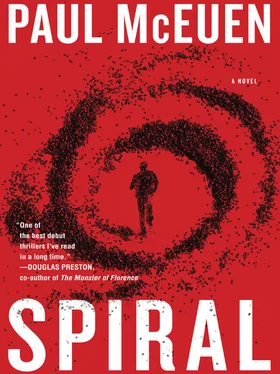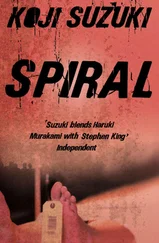By summer, the war against the Americans in the Pacific was lost. Tokkō was Japan’s doomed, romantic last-ditch effort to change the tide of the war against the imperialist Westerners. Machines of steel had failed. The machines of flesh were the last hope. Thousands of young Japanese soldiers, bravely piloting planes, boats, and human-guided torpedoes on one-way missions aimed at the heart of the enemy. In the West, they would be known by another Japanese name, a word that translates as “God-wind,” after a pair of typhoons that destroyed a Mongol invasion in the thirteenth century.
God-wind. Kamikaze .
But even this could not stop the Americans.
August had arrived hot and bleak in northern China. The Soviets were amassing to the north. All was in chaos. An entirely new kind of bomb had been dropped on Hiroshima and Nagasaki, reducing them to rubble in seconds. The Soviets launched their attack, cutting through the lines of the Japanese Kwantung Army with ease. All was nearly lost. They would overrun Unit 731 within days.
The order came. All remaining prisoners killed, all records destroyed.
Eight men assemble in the room. The oldest was General Shiro Ishii, then fifty-three years old, his city of terror soon to be reduced to dust. Kitano stood beside him. The other six are Tokkō volunteers, none older than twenty. Ishii has been their commander and father, has supervised their training personally for months. He was usually brusque with them, almost cruel. But today he is solemn. Ishii opens the hinoki box, and to each Tokkō soldier he gives a cylinder, bowing respectfully.
These six would carry the last, most terrible breath of the God-wind. They are the breathers of Uzumaki.
They were the last hope.
Each Uzumaki specimen was contained in a small canister the size and shape of a cigar, bronze metal, two pieces threaded to lock and then sealed with wax at the joint. There were six of these canisters, contents identical, arranged in a polished hinoki cypress wooden box with inlays cut especially for them. The brass cylinders and hinoki box were constructed by the best craftsmen that the Japanese Imperial Army had to offer. Once a month, the cylinders were removed, and new ones put in their place. Unit 731 scientists were still working, improving, testing. This box contained the high-water mark of their achievement.
For Kitano, the seventh Tokkō, they had made a special cylinder, small enough to be implanted in his finger bone.
He would lie in wait as the submarines carried away the other six. If they failed, he would succeed. Slip into the world of his enemy and wait for the right moment. Confess everything, earn their trust. Then find his way to the right spot, somewhere in the north. He’d memorized the bottlenecks for all the major flyways. Migratory birds were almost perfect vectors for the Uzumaki. They could have spread the deadly fungus over the entire country in a matter of days.
He would have succeeded. Had it not been for Liam Connor.
WALLY STOPPED THE CRAWLER OVER THE FIFTH VENTILATION duct it passed, the one over crazy-old-man Kitano’s cell. He made the little robot spider tilt so the camera looked down through the vent. The image wasn’t much, like a thumbnail, but you could clearly see the old bastard on his bunk, staring off into space.
This better work , Wally thought. Kitano was one bad old Jap. This went right, he was rich. But this goes wrong, Wally Atherton was a dead man.
Wally moved his fingers. The little spider dropped through the grate and fell like a tiny little leaf, the camera shot spinning, spiraling down and down to the target below.
 41
41 
THE DEPUTY DIRECTOR OF THE FBI SAT ACROSS FROM DUNNE in the reinforced-steel-and-bulletproof-glass limo, but the two hadn’t spoken in more than fifteen minutes. There wasn’t much to say.
The vehicle sped down I-68 at more than ninety miles an hour, a West Virginia state trooper escort in front and behind, lights on but sirens off. The Morgantown airport was ten miles behind them, and the federal United States Penitentiary in Hazelton was another six ahead. On the seat next to Dunne was a Lucite box containing two of Kitano’s pigeons. More birds were in the trunk.
Kitano was waiting in his cell. Kitano had been told. He’d demanded to see Dunne.
Dunne’s job was to get Kitano to agree to turn himself over.
The plan that the Army settled on was simple: give Orchid the money, give her Hitoshi Kitano, and then blow them both to hell.
DUNNE THOUGHT OF THE LAST TIME HE HAD SEEN KITANO out of prison. It had been at the old man’s estate in Maryland, west of D.C. Kitano’s compound was relatively modest by billionaire standards; set atop a hill, a shed-roofed clutch of modernist buildings were linked by glass walkways.
An assistant, Japanese, had led Dunne through the main house. The inside was spare, bamboo floors and white walls with only a few abstract paintings and a collection of Japanese swords interrupting the emptiness. Historically, samurai warriors had tested the quality of a sword by cutting through the stacked corpses of executed criminals. Kitano was a fanatic for swords—like most Japanese nationalists, he fetishized the blade. Dunne remembered a quote by Nietzsche, he thought: “Every murderer loves the knife.”
The entire back wall of Kitano’s home was glass, looking out on ten acres of pristine lawn and landscaped gardens. Dunne could picture him clearly that day, standing outside, looking down the hill, stroking the breast of one of his pigeons.
By then Kitano was already in deep trouble. He was forbidden from leaving the country, had been charged with federal tax fraud. His empire was bleeding. Investors were withdrawing their money, and his business partners were shunning him. Kitano’s entire world, his carefully constructed reality, had been slit open, and Dunne knew the hand on the knife had been his own.
Dunne had stepped through a sliding glass door. The weather that fall day was cool but sunny. On a teak table next to Kitano were two glasses and a bottle of scotch, along with a plate of pâté. Dunne recognized the scotch. It was Macallan, Special Reserve, 1945. A ten-thousand-dollar bottle.
“Please,” Kitano said.
Dunne poured a glass. Kitano tossed the pigeon upward. “Watch,” he said.
The bird flew in a tight circle, then performed what amounted to a backflip in the air. The bird did the aerial somersault twice more before returning to Kitano’s arm. “No good for racing, but they are a pleasure nonetheless, no?”
“Is it a new breed?”
“Heavens, no. This is an English short-faced tumbler. They’ve been around for centuries. Charles Darwin wrote about them.” Kitano headed toward the coop, and Dunne followed. Coop didn’t capture the sense of the place. It was a miniature pigeon palace. Seated on glass shelves were nests, each like a little apartment, with separate food and water. Kitano returned the English short-faced tumbler to its home, then went back outside, another pigeon in tow. “This is a racer. There is a red string on that tree, the large one at the end of the field. Watch.”
Kitano tossed the pigeon upward, and it shot off in the direction of the tree.
Kitano said, “Try the matsutake and hazelnut pâté. It is the perfect season in the pine forests of Japan. My chef has a special preparation. He marinates them in blood.” Kitano used a small metal spoon to scoop the mushroom pâté onto a cracker. He took a bite, then prepared one for Dunne. Dunne found its sharp taste seductive. Many of his sophisticated, expensive tastes could be traced to this man. Kitano had opened up new worlds.
Читать дальше

 41
41 










